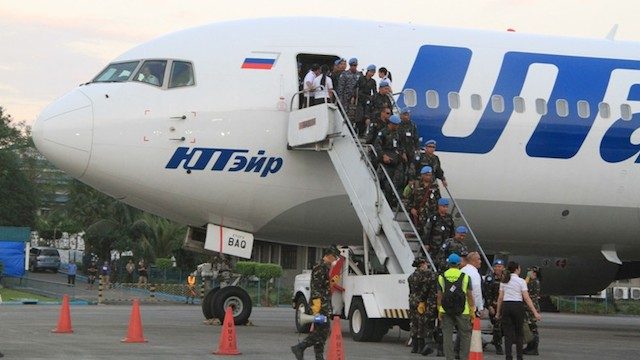SUMMARY
This is AI generated summarization, which may have errors. For context, always refer to the full article.

MANILA, Philippines – The Filipino peacekeeper who fell ill after returning from Ebola-hit Liberia has tested negative for the Ebola virus, the Department of Health announced on Saturday, November 15.
However, the peacekeeper confined at the Research Institute for Tropical Medicine (RITM) tested positive for malaria, said Acting Health Secretary Janette Garin.
“The Philippines is still Ebola-free….But we’re sad to say that he tested positive for malaria,” Garin said in a news conference at the National Kidney and Transplant Institue.
Asked if a second Ebola test is necessary, she said, “Sinuri, tiningnan, sinigurado, negatibo po talaga (He was tested and checked. He’s really negative).”
The peacekeeper has been moved to a regular room for combination treatment, which may take from 3 to 5 days. After his recovery, he will be brought back to Caballo Island to complete the 21-day mandatory quarantine.
Garin said it’s fortunate that the soldier’s case of malaria is still in the early stage as there are no other complications arising from the disease.
The peacekeeper was initially placed in an isolation room in Caballo Island, where the 133 United Nations peacekeepers are on a 3-week precautionary quarantine since they arrived from Liberia on November 12. He was later moved to the RITM for further observation.
Health officials said the peacekeeper had malaria in the past, so he was also checked for a possible malaria relapse, aside from the test for Ebola.
The UN peacekeepers – 108 soldiers, 24 cops, and a jail officer who served the UN Mission in Liberia – are on precautionary quarantine on Caballo Island, a Philippine Navy outpost located at the mouth of Manila Bay.
They initially tested negative for Ebola, based on a screening conducted by the UN health team. (READ: Quarantine for Liberia troops: We’re playing safe – DOH)
The Ebola virus, which can be transmitted through bodily fluids, causes severe fever, muscle pain, weakness, vomiting, and diarrhea. In some cases, it also causes organ failure, unstoppable bleeding, and can kill victims in just days. (READ: 5 misconceptions about Ebola)
The World Health Organization announced on Wednesday that the 2014 Ebola outbreak has already killed 5,160 people from around 14,000 cases, mostly in Guinea, Liberia, and Sierra Leone. – Rappler.com
Add a comment
How does this make you feel?
There are no comments yet. Add your comment to start the conversation.